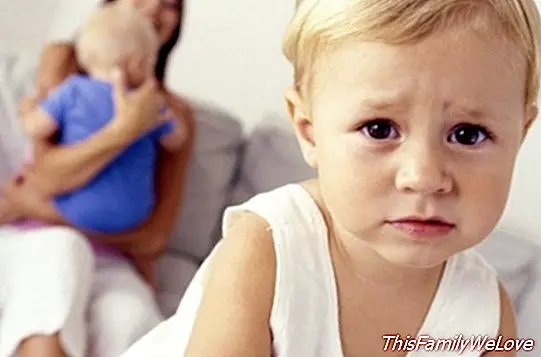How jealousy manifests

In spite of striving to educate our children well, there is no doubt that the greatest attention always falls on the youngest, which can be translated into jealousy on the part of the major. Knowing how these jealousies manifest themselves, their age of appearance and why of their feelings can help the child overcome his stage of jealousy towards his brother / sister.
The 'jealous brother' usually perceives that the arrival of a baby takes away the exclusivity and he feels that he will have to share the love of his parents "with one more", arising in his little head many doubts that They manifest as jealousy.
Why older brothers are jealous
The childish jealousy arise before the threats-erroneous or not-that the child perceives with respect to the affective bond, preferably with his mother. It is an attitude intimately related to the attachment behavior, that the child acquires the first months of life. This manifests itself through the desire to keep physically close to his mother. So, when exploring the environment, look for approval and confirmation that their activities do not involve any danger.
Usually, jealousy arises as a defensive response when the mother begins to deal almost exclusively with the youngest brother. If attachment and affective ties are broken, the consequences that the child would suffer would be large, so it is normal to feel your threatened world. Jealousy and anxiety are only the manifestations of affective imbalance in a particularly sensitive period.
When jealousy appears between brothers
Children's jealousy they do not usually appear before a year and a half of life, extending throughout early childhood until around 7 years. Most often, the birth of a new brother is the main trigger of jealous behavior, varying the manifestations according to age.
At the age of 2 years it can manifest feelings of abandonment: attacking their parents when they care for or praise the little brother, before the enthusiasm of their first steps or taking their toys, etc. If the jealous behavior is quite important, the child may suffer feelings of guilt and try to compensate his brother with exaggerated manifestations of affection.
The arrival of a new sibling can generate more or less jealousy depending on the difference of age with the previous ones, the sex of these and the place that is occupied in the family, which makes it have more or less prominence. For example, the first will always be the largest and will have no rivalry in this. Although it is sometimes inevitable that the "and me, what?" With a little patience, some foresight and extra dose of affection, you can make the child come to consider this event as one of the most exciting and happy of his life.
The first days after returning home you have to pay special attention to the dethroned so that you do not feel displaced from the love of your parents. He is probably irritable and moody, but the speeches will not be worth anything and, of course, it is not the time to scold him. What you need are continuous demonstrations of affection. Do not skimp on kisses, hugs, caresses, etc. It is also the moment to make him see that he is no longer the little one, which entails certain privileges: being able to sit down to eat with his parents, wash his hands without help or take the glasses to dad, can be wonderful advantages for him, that will avoid the desire to imitate the behavior of the baby-peeing in bed, crying continuously-to attract attention.
How jealousy manifests
- Retracts in speech. He expresses himself with gestures, but he does not verbally explain things.
- Appearance of enuresis.
- Assaults on the younger brothers.
- Loses appetite, vomits or makes "antics" in the hours of breakfast, lunch or dinner.
- Loses the rhythm of sleep.
- Tantrums or temper tantrums appear more frequently.
- He starts to cry easily for anything.
- His hair falls out, especially in apparently calm children who show love towards the newcomer.
- He behaves like a child smaller than corresponds to his age.
- Hit the father or mother when she gets angry.
- Has more conflicts with classmates.
- When competing seeks the humiliation of the other and not the triumph in itself.
- He does not usually talk about the new brother or shows an attitude of over affect with this one.
- When praising others, he also claims praise for him.
- Not usually happy about the good things that happen to the rest of the brothers.
- Since the birth of the baby, it costs more to share.
Maria Lucea




